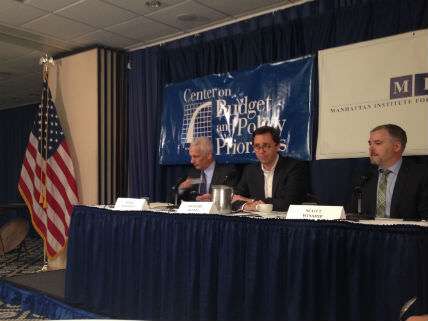Increasing Social Mobility Is Hard. Here's Why That's Not Changing Any Time Soon.
We shouldn't choose policies based on how they make us feel. And yet...

A poor teenager with top math scores is no more likely than a rich teenager with mediocre math scores to complete college, according to a new study. To many, this is a poignant expression of America's lack of social mobility—a phenomenon in which those born into poverty, regardless of how hard they work, struggle and often fail to attain a better life.
There's broad agreement that low social mobility is undesirable. Yet if this morning's discussion at the National Press Club is any indication, the prospects for bipartisan consensus about what to do about it are nothing short of bleak.
To figure out how to avoid outcomes like the college-completion-rate gap cited above, the Peter G. Peterson Foundation recruited two scholars from opposite sides of the ideological divide to offer a set of concrete policy recommendations.
On the right was the Manhattan Institute's Scott Winship, who noted up front that his agenda offered "something for everybody to hate." But while much of the discussion focused on his "radical" proposal to expand the child tax credit only for married couples (an idea that is admittedly unlikely to garner much support around the Reason parts), I thought a more telling moment came when the conversation turned to higher education financing.
Winship's agenda calls for something known as "income share agreements," or ISAs, which he describes in his paper, "Up: Expanding Opportunity in America," as follows:
ISAs are contracts between students and investors whereby investors agree to a specific amount of financial assistance for higher-education expenses in exchange for a claim on a specific percentage of the student's future income for a specific number of years. Just as entrepreneurs are willing to pay future dividends to shareholders in return for capital to invest in their businesses, many students would benefit from voluntarily paying "dividends" to "shareholders" to invest in their own human capital.
Cool idea, right? Of Winship's seven policy proposals, this was the one that struck me as most interesting. (It's also the only real market-based reform in the paper.) The response it got from his sparring partner on the left, however, reveals a lot about just how divergent the two sides' worldviews are.
Jared Bernstein is a senior fellow at the Center on Budget and Policy Priorities and a former Obama adviser. Along with his colleague Ben Spielberg, he authored the liberal counterpart to Winship's paper for the Peterson Foundation project, and he was there at the Press Club to present his recommendations and critique the latter's ideas. When it came to ISAs, here's what he had to say:
I generally don't like that idea. I don't think it'll work out nearly as well as Scott described it. I worry that we're trying to take what is a very important and valued public good and trying make it a private one, by setting up some kind of investment market. I don't view those markets as particularly efficient these days. I don't think they process information particularly well. And I think there'd be a real salient concern that investors would underinvest in students. There's also a kind of indentured servitude to the idea that strikes me as just kind of morally wrong.
Setting aside his, shall we say, questionable definitions of public vs. private goods, that last sentence is where I'd draw your attention. Bernstein's position is that it's morally wrong to allow someone to voluntarily enter into a contract he or she prefers to all available alternatives. And his rationale for that position is that the way the exchange is structured makes him feel squeamish.
It is perhaps unfair to hold a left-liberal Democrat to the standards of libertarian political philosophy. For all I know, Bernstein openly embraces a policy of paternalism—of government interventions aimed at saving people from themselves.
Given his stated objective of increasing economic mobility, the opposition to ISAs remains hard to make sense of. Allowing private investors to bet on students provides an additional avenue for securing financing for college. It empowers students to shop around and even negotiate the terms before deciding which contract is best for them. It offers the peace of mind of knowing that your loan payments will never rise as a percentage of your income, even if you end up needing to take a lower-paying job than you were expecting. And, as Winship pointed out, it creates an incentive for colleges to work hard at raising their graduation rates, so more investors will agree to finance their students.
Still, the ease with which naysayers can paint such a system as evil and exploitative virtually assures that Winship's proposal won't get off the ground. If even someone with a Ph.D. who works on mobility issues for a living is discomfited by the idea of ISAs, there's little hope of convincing the far-less-engaged voting public to get behind them. And politicians don't want to support a program that could be conflated, however unfairly, with indentured servitude.
In the end, it was Bernstein himself who pinpointed the real reason issues like this are so hard to address. Begins the last paragraph of his paper: "Our biggest barrier to economic opportunity for all Americans is neither structural, budgetary, nor evidentiary—it is political."
